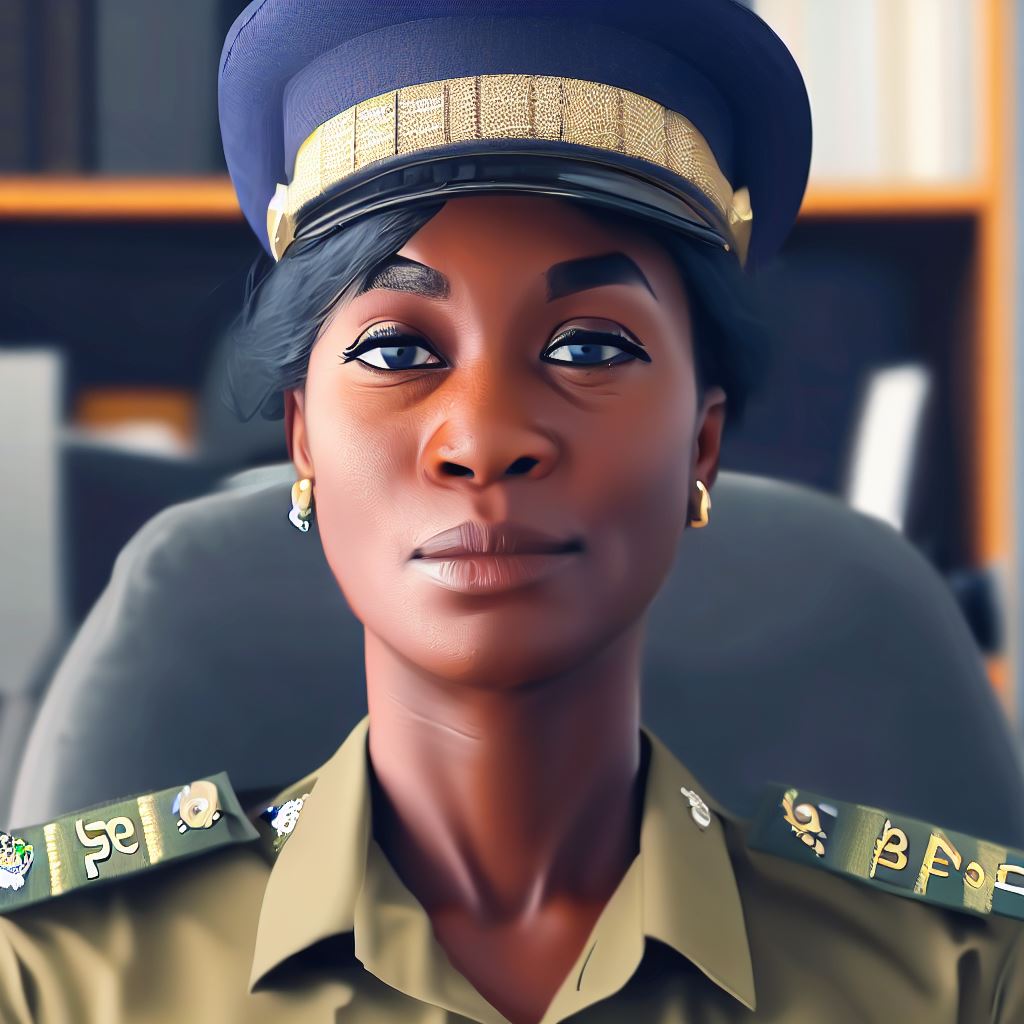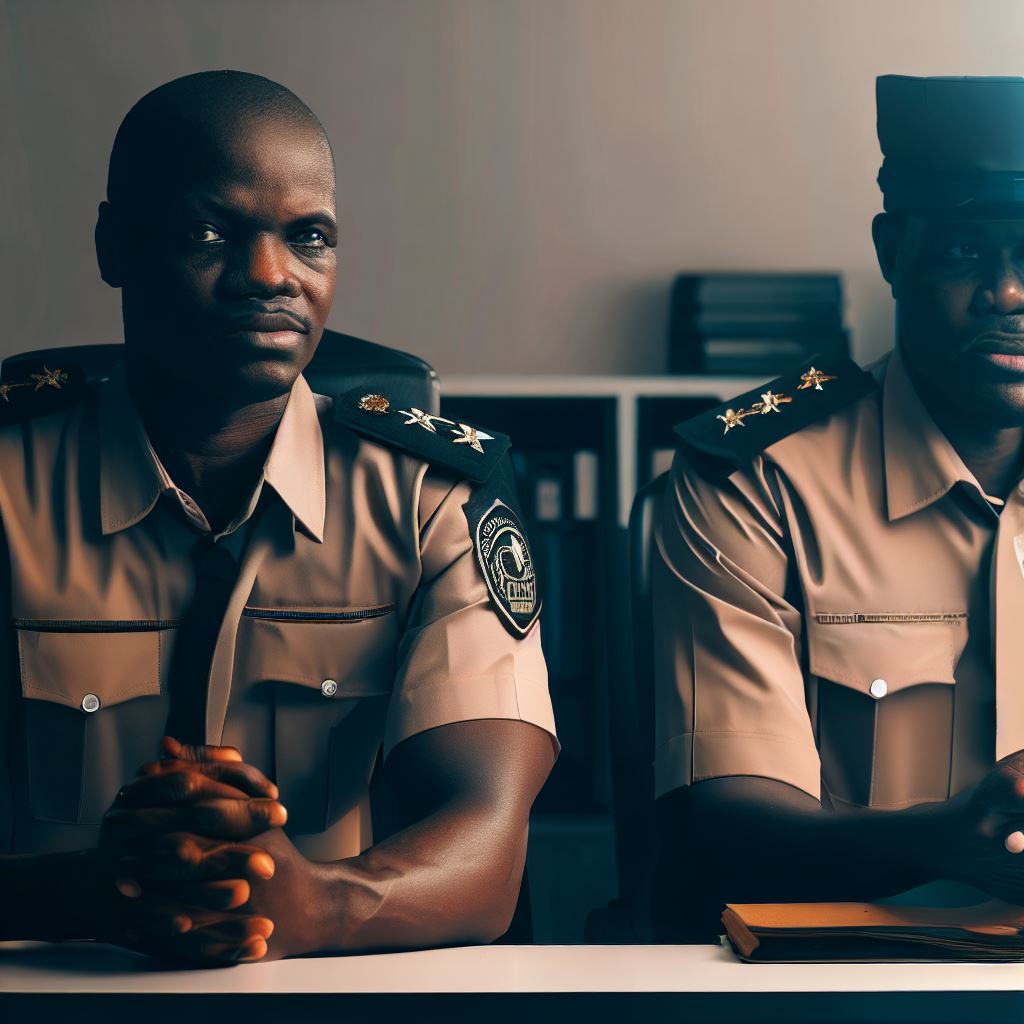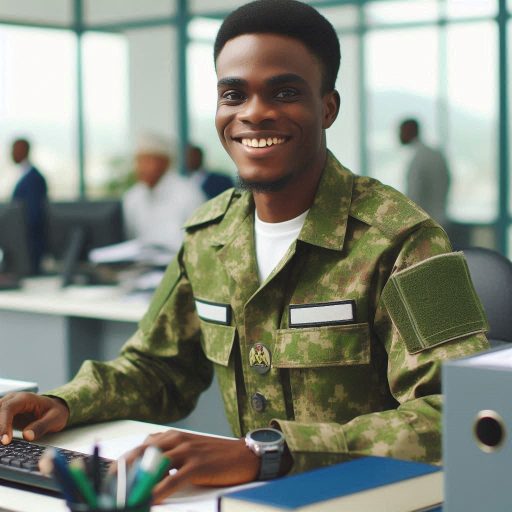Introduction
Joining the police force in Nigeria has become an increasingly popular career choice, as more and more individuals are eager to make a difference in their communities.
This step-by-step guide will provide you with all the necessary information to navigate the process successfully.
Joining the police force in Nigeria is a rigorous process, but with determination and proper preparation, you can successfully navigate each step.
By following this step-by-step guide, you will be one step closer to pursuing a rewarding career in law enforcement and serving your country.
Meet the Basic Requirements
To join the police force in Nigeria, there are certain basic requirements that you need to meet.
These requirements include the following:
- Age: You must be between the ages of 18 and 25 to apply.
- Educational qualifications: A minimum of a secondary school certificate is required. Higher qualifications are also accepted.
- Physical fitness: Applicants must be physically fit and in good health.
- Citizenship requirements: You must be a Nigerian citizen by birth or descent.
In addition to the basic requirements, there are also specific requirements depending on the entry position you are interested in:
1. Cadet Entry Position
- You must possess a bachelor’s degree or Higher National Diploma (HND) from a recognized institution.
- Your age should be between 21 and 25.
- You must have completed the National Youth Service Corps (NYSC) program.
2. Officer Entry Position
- A minimum of a bachelor’s degree is required.
- Your age should be between 23 and 28.
- You must have at least five years of active service in the Nigeria Police Force or have served in any paramilitary organization.
3. Inspector Entry Position
- A higher national diploma or a university degree is required.
- Your age should be between 23 and 28.
- You must have at least three years of active service in the Nigeria Police Force or have served in any paramilitary organization.
4. Assistant Superintendent of Police (ASP) Entry Position
- You must have a bachelor’s degree or a higher national diploma.
- Your age should be between 23 and 28.
- A minimum of three years of active service in the Nigeria Police Force or any paramilitary organization is required.
5. Superintendent of Police (SP) Entry Position
- A bachelor’s degree or a higher national diploma is required.
- Your age should be between 23 and 28.
- You must have at least eight years of active service in the Nigeria Police Force or have served in any paramilitary organization.
6. Chief Superintendent of Police (CSP) Entry Position
- You must possess a bachelor’s degree or higher national diploma.
- Your age should be between 23 and 28.
- You must have at least ten years of active service in the Nigeria Police Force or have served in any paramilitary organization.
7. Assistant Commissioner of Police (ACP) Entry Position
- A bachelor’s degree or a higher national diploma is required.
- Your age should be between 28 and 35.
- A minimum of fifteen years of active service in the Nigeria Police Force or any paramilitary organization is required.
8. Deputy Commissioner of Police (DCP) Entry Position
- You must have a bachelor’s degree or a higher national diploma.
- Your age should be between 35 and 45.
- You must have at least twenty years of active service in the Nigeria Police Force or have served in any paramilitary organization.
9. Commissioner of Police (CP) Entry Position
- A bachelor’s degree or a higher national diploma is required.
- Your age should be between 45 and 50.
- You must have at least twenty-five years of active service in the Nigeria Police Force or have served in any paramilitary organization.
Meeting the basic requirements and specific requirements for your desired position is the first step in joining the police force in Nigeria.
Make sure you fulfill these criteria before proceeding to the next steps.
Read: Nigeria’s Special Police Units: A Comprehensive Overview
Research the Nigerian Police Force
A. Overview of the Nigerian Police Force structure and hierarchy
The Nigerian Police Force is a structured organization with a clear hierarchy and various specialized units.
Here is an overview of the Nigerian Police Force structure and hierarchy:
- The Inspector General of Police (IGP) is the highest-ranking officer and is responsible for the overall control and administration of the force.
- Below the IGP are Deputy Inspectors General of Police (DIGs) who oversee specific departments.
- Assistant Inspectors General of Police (AIGs) are responsible for zonal commands and oversee multiple states.
- Commissioners of Police (CPs) are in charge of state commands and report to the AIGs.
- Deputy Commissioners of Police (DCPs) assist the CPs in managing the police commands.
- Assistant Commissioners of Police (ACPs) are responsible for divisions within a command.
- Superintendent of Police (SP) is the head of a police station or unit.
- Deputy Superintendent of Police (DSP) assists the SP in managing the station or unit.
- Assistant Superintendent of Police (ASP) is an entry-level officer with supervisory responsibilities.
B. The different units within the force (e.g., mobile police, criminal investigation department)
The Nigerian Police Force has several specialized units:
- Mobile Police Force (MOPOL): Also known as the MOPOL or MOPOL 1, it is responsible for maintaining law and order, crowd control, and riot response.
- Criminal Investigation Department (CID): The CID handles investigations into serious crimes such as robbery, murder, and fraud.
- Special Anti-Robbery Squad (SARS): SARS focuses on combating armed robbery and other violent crimes.
- Intelligence Response Team (IRT): The IRT is a specialized unit that deals with high-profile criminal cases, kidnappings, and terrorism.
- Anti-Human Trafficking Unit (AHTU): AHTU is dedicated to tackling human trafficking and related offenses.
- Counter Terrorism Unit (CTU): CTU is responsible for preventing and countering terrorist activities.
- Public Relations Unit (PRO): PRO is responsible for managing the relationship between the police force and the public.
C. Roles and responsibilities of police officers in Nigeria
Roles and responsibilities of police officers in Nigeria:
- Maintaining law and order by preventing and detecting crimes.
- Protecting life and property of citizens.
- Enforcing traffic regulations and ensuring road safety.
- Investigating and solving crimes through intelligent gathering and analysis.
- Arresting and prosecuting offenders in accordance with the law.
- Providing assistance and support to victims of crimes and accidents.
- Maintaining public order during protests and other civil disturbances.
- Community policing and building positive relationships with the community.
Joining the Nigerian Police Force requires dedication, physical fitness, and a desire to serve the nation.
By researching the structure, hierarchy, and units within the force, aspiring police officers can gain a better understanding of the organization they aim to join.
Furthermore, understanding the roles and responsibilities will prepare them for the challenges they may face in the line of duty.
Read: The Relationship between the Police and the Public in Nigeria
Prepare for the Recruitment Process
Once you have met the basic requirements and submitted your application, it’s time to start preparing for the recruitment process.
This step is crucial as it will determine whether or not you make it through to the next stage of joining the police force in Nigeria.
A. The recruitment process and timeline
The recruitment process for joining the police force in Nigeria consists of several stages.
It is important to familiarize yourself with the timeline and understand the sequence of events that will follow after submitting your application.
Each stage of the recruitment process has its own specific requirements and evaluation criteria.
Therefore, it is crucial to perform well in each stage to increase your chances of success.
B. Importance of properly preparing for each stage
Properly preparing for each stage of the recruitment process is essential as it allows you to showcase your skills, abilities, and potential as a future police officer.
Failing to prepare adequately can significantly diminish your chances of success.
It is essential to understand the expectations and requirements of each stage in order to tailor your preparation accordingly.
Remember, each stage is designed to assess different aspects of your physical fitness, knowledge, and suitability for the role.
C. Tips and resources for preparing effectively
To effectively prepare for each stage of the recruitment process, follow these tips:
1. Written exam
- Study relevant subjects such as English, mathematics, general knowledge, and current affairs.
- Review previous question papers to get an idea of the exam format and types of questions.
- Practice time management to ensure you complete the exam within the given timeframe.
2. Physical fitness test
- Engage in regular exercise and physical training to improve your stamina and overall fitness.
- Focus on activities that simulate the physical challenges you may encounter during police duties.
- Practice running, sit-ups, push-ups, and other exercises commonly included in fitness tests.
3. Interview
- Research common interview questions and prepare thoughtful, structured responses.
- Showcase your knowledge of the police force, its values, and your commitment to public service.
- Practice with a friend or family member to improve your communication and interview skills.
4. Medical examination
- Ensure you are in good physical and mental health before the examination.
- Visit your doctor for a comprehensive check-up to address any potential health concerns.
- Follow any specific instructions provided by the recruitment authorities regarding the medical examination.
Additionally, utilize resources such as online study materials, mock exams, fitness training programs, and interview preparation guides to enhance your readiness for each stage.
Remember, proper preparation is key to successfully navigating the recruitment process and joining the police force in Nigeria.
Stay focused, dedicated, and committed to realizing your dream of becoming a police officer.
Read: The Impact of Traditional Policing in Nigerian Communities
Apply and Register Online
A. How to apply and register through the official Nigerian Police Force recruitment portal
Applying and registering for the Nigerian Police Force can be done conveniently through the official recruitment portal. Follow these guidelines:
- Visit the official Nigerian Police Force recruitment portal.
- Create an account by providing your email address and choosing a strong password.
- Log in to your newly created account.
B. The registration process and required documents
Read and understand the instructions and requirements for the application process.
Prepare the necessary documents for upload, which may include:
- Valid means of identification (e.g., national ID card, driver’s license, or international passport).
- Birth certificate or age declaration affidavit.
- Educational certificates/documents.
- Proof of local government area of origin.
- Passport-sized photograph with a white background.
- Proof of your state of origin.
- Any other relevant documents specified on the recruitment portal.
- Ensure that all the required documents are scanned or properly photographed for online submission.
- Click on the “Apply” or “Register” button, depending on the options available on the portal.
C. Guidance on filling out the application form accurately and honestly
- Provide accurate personal information in the application form, including your full name, date of birth, and contact details.
- Fill in your educational qualifications and work experience, if any.
- Select the rank and position you are applying for within the Nigerian Police Force.
- Upload the scanned or photographed copies of the required documents.
- Review your application form to ensure all details are correct and accurately filled.
- Submit your application form through the online submission system.
- Take note of the application reference number provided upon successful submission.
- Print a copy of your application acknowledgment slip for reference purposes.
- Wait for further instructions or notifications from the Nigerian Police Force recruitment team.
It is crucial to follow the registration process carefully and provide accurate information in your application form. Any false declaration or submission of incorrect documents may lead to disqualification.
Additionally, avoid engaging in any form of fraudulent activity during the application process, including payment requests from unauthorized individuals or entities.
The Nigerian Police Force recruitment portal is the only authorized platform for registration, and it is completely free of charge.
Remember to regularly check the official recruitment portal or your provided email address for updates on the status of your application.
Stay alert for any news or announcements regarding physical screening, aptitude tests, and interviews after the application deadline.
By adhering to the registration guidelines and being truthful throughout the process, you enhance your chances of successfully joining the Nigerian Police Force.
Read: Working Conditions of Police Officers in Nigeria: A Study

Prepare for the Written Exam
Once you have successfully submitted your application and passed the physical fitness test, the next step in joining the police force in Nigeria is to prepare for the written exam.
This exam will test your knowledge on various topics related to law enforcement and general aptitude.
A. Topics Covered in the Written Exam
- Basic Mathematics: You can expect questions on topics such as arithmetic, algebra, geometry, and statistics.
- English Language: This section will assess your grammar, vocabulary, comprehension, and writing skills.
- Current Affairs: Questions related to national and international events, politics, history, and sports may be included.
- General Knowledge: This section will test your knowledge on a wide range of subjects, including science, geography, and culture.
It is important to cover all these topics thoroughly to maximize your chances of performing well in the exam.
B. Suggested Study Materials and Resources
- Past Exam Papers: Solving previous years’ exam papers will give you an idea of the exam pattern and the types of questions asked.
- Recommended Books: Look for trusted study materials specifically designed for police recruitment exams in Nigeria.
- Online Resources: There are several websites and forums that provide study materials, practice tests, and tips for exam preparation.
- Coaching Classes: Joining a coaching institute or hiring a private tutor can provide structured guidance and help you focus on the important topics.
Choose the study materials and resources that suit your learning style and preferences.
C. Tips for Effective Exam Preparation and Time Management
- Create a Study Plan: Make a timetable that allocates enough time for each subject based on its weightage and your level of familiarity.
- Understand the Exam Pattern: Familiarize yourself with the format and structure of the exam to know what to expect on the day.
- Practice Regularly: Solve sample papers and practice questions to improve your speed and accuracy.
- Focus on Weak Areas: Identify your weak subjects or topics and allocate additional time to master them.
- Stay Updated: Keep yourself updated with the latest current affairs and news to perform well in the relevant section.
- Take Mock Tests: Attempting mock tests will help you simulate the actual exam environment and identify areas for improvement.
- Manage Time Effectively: During the exam, allocate appropriate time to each section to ensure you can attempt all questions.
- Stay Calm and Confident: Practice relaxation techniques to manage exam stress and approach the exam with confidence.
Remember to get enough sleep before the exam day and arrive early to the examination center.
Stay focused, manage your time well, and tackle the questions with a calm and composed mindset.
By following these steps and preparing diligently for the written exam, you will be one step closer to joining the police force in Nigeria. Good luck!
Physical Fitness Preparation
A. The importance of physical fitness in the police force
Physical fitness is of utmost importance in the police force. It plays a vital role in ensuring the efficiency, effectiveness, and safety of police officers on duty.
Therefore, candidates aspiring to join the Nigerian Police Force must prioritize their physical fitness preparation.
B. Fitness routine and training plan to help candidates prepare
To help candidates prepare for the physical fitness requirements of the police force, here is a suggested fitness routine and training plan:
- Cardiovascular exercises: Engaging in activities such as running, cycling, or swimming helps improve stamina and endurance, which are essential for police officers.
- Strength training: Incorporate exercises like squats, lunges, push-ups, and pull-ups to build muscle strength and increase overall body fitness.
- Interval training: Alternating between high-intensity exercises and brief recovery periods helps improve cardiovascular fitness and stamina.
- Flexibility exercises: Stretching exercises like yoga or pilates enhance flexibility, prevent injuries, and improve overall physical performance.
- Core strengthening: Focus on exercises that target the core muscles, such as planks, crunches, and Russian twists. A strong core is essential for stability and overall strength.
C. Tips for boosting physical performance and maintaining a healthy lifestyle
In addition to following a fitness routine, candidates must also maintain a healthy lifestyle to boost their physical performance.
Here are some tips:
- Proper nutrition: Eat a balanced diet that includes a variety of fruits, vegetables, lean proteins, and whole grains to fuel your body with necessary nutrients.
- Hydration: Drink an adequate amount of water throughout the day to stay hydrated, especially during training sessions or physical activities.
- Adequate rest: Allow your body time to recover and repair itself by getting enough sleep each night. Rest is crucial for muscle growth and overall well-being.
- Avoid harmful substances: Steer clear of tobacco, drugs, and excessive alcohol consumption as they can negatively impact your physical and mental health.
- Mental preparation: Engage in activities like meditation or deep breathing exercises to reduce stress, improve focus, and enhance overall mental well-being.
By following a comprehensive fitness routine and maintaining a healthy lifestyle, candidates will be able to boost their physical performance and increase their chances of successfully joining the Nigerian Police Force.
It is important to note that physical fitness preparation is an ongoing process. Candidates should consistently evaluate their fitness levels, reassess goals, and adapt their training plan accordingly.
Additionally, seeking guidance from fitness professionals or trainers can provide personalized advice and support throughout the preparation journey.
Remember, physical fitness goes hand in hand with mental and emotional well-being.
A strong and fit body contributes to enhanced job performance and ensures the safety of both police officers and the communities they serve.
Interview Preparation
Preparing for the interview is a crucial step in your journey to join the Police Force in Nigeria.
This is your opportunity to showcase your skills, abilities, and suitability for the role.
Here are some important points to keep in mind:
A. Different Types of Interviews Conducted During the Recruitment Process
- Panel Interview: A group of interviewers will ask you a series of questions to assess your abilities and personality.
- Behavioral Interview: This type of interview focuses on your past experiences and how you handled specific situations.
- Competency-based Interview: You will be asked questions related to specific skills and competencies required for the job.
B. Advice on Common Interview Questions and How to Answer Them Effectively
- Why do you want to join the Police Force? Highlight your passion for serving the community and maintaining law and order.
- What relevant skills and experiences do you possess? Discuss any previous security or law enforcement roles, relevant training, or volunteer work.
- How do you handle high-pressure situations? Emphasize your ability to remain calm, make quick decisions, and effectively manage stressful scenarios.
- How would you deal with a difficult person? Showcase your communication and conflict resolution skills by providing examples from your past experiences.
- What are your strengths and weaknesses? Focus on strengths that align with the requirements of a police officer and discuss how you are working on improving your weaknesses.
C. Guidance on Body Language, Attire, and Overall Presentation During the Interview
- Body Language: Maintain good posture, make eye contact, and use appropriate hand gestures to convey confidence and attentiveness.
- Attire: Dress professionally in a well-fitting suit or formal attire. Pay attention to grooming, and avoid excessive accessories or strong perfumes/colognes.
- Overall Presentation: Be punctual, greet the interviewers with a firm handshake, and maintain a positive and enthusiastic attitude throughout the interview.
Remember, the interview is not only about your verbal responses but also your non-verbal cues. Your body language and overall presentation can leave a lasting impression on the interviewers.
Practice answering common interview questions to enhance your confidence and improve your response quality. Good luck!
Medical Examination and Background Check
After successfully completing the previous steps in joining the Police Force in Nigeria, the next stage is the medical examination and background check.
These processes are crucial to ensure that only the physically and mentally fit candidates with impeccable character are admitted into the force.
A. Purpose of the Medical Examination and Background Check
The medical examination aims to assess the overall health condition and fitness level of the applicants.
It includes various tests such as blood tests, vision and hearing examinations, physical fitness tests, and psychological evaluations.
The purpose is to identify any underlying medical conditions that might affect the candidate’s ability to perform their duties effectively.
The background check, on the other hand, is conducted to verify the integrity and character of the applicants.
It involves investigating their educational qualifications, employment history, criminal records, and personal references.
The objective is to ensure that individuals with a history of misconduct, criminal activities, or dishonesty are not recruited into the force.
B. Tips for Preparing for the Medical Examination
Here are some tips to help candidates prepare for the medical examination:
- Get a good night’s sleep before the examination to be well-rested and alert.
- Follow any specific instructions provided, such as fasting requirements for certain tests.
- Bring all necessary documents and identification as instructed by the recruitment authorities.
- Wear comfortable clothing and appropriate footwear for the physical fitness tests.
- Inform the examining physician about any pre-existing medical conditions or medications being taken.
- Stay calm and relaxed during the examination to ensure accurate test results.
C. Emphasizing Honesty and Integrity
Throughout the entire recruitment process, honesty and integrity are of utmost importance.
It is crucial for candidates to be completely truthful during the medical examination and background check.
Attempts to hide medical conditions or provide false information can result in disqualification from the recruitment process.
Additionally, any attempts to manipulate or deceive during the background check will be discovered, and this can have serious consequences.
Being transparent and forthcoming with information demonstrates the candidate’s commitment to upholding the values and standards of the Police Force.
It is essential to understand that the medical examination and background check serve as a vital screening process.
They ensure that only the most qualified and trustworthy individuals are chosen to serve and protect the citizens of Nigeria.
In general, the medical examination and background check are critical steps in joining the Police Force in Nigeria.
By preparing adequately, being honest throughout the process, and emphasizing integrity, aspiring candidates can increase their chances of successfully passing these stages and moving closer to fulfilling their dream of becoming police officers.
Training and Joining the Police Force
A. The training process for successful candidates
After successfully passing all the previous steps, it is time for the training process to become a member of the Nigeria Police Force.
Here are some key aspects to consider:
- The Training Process: Successful candidates will undergo rigorous training at designated police training academies.
- Training Academies: There are several training academies across Nigeria, such as the Police College in Lagos, Jos, Maiduguri, and Kaduna.
- Minimum Requirements: Each training academy has specific requirements that applicants must meet to be eligible for training.
- Physical Fitness: Candidates should be prepared for physically demanding activities during the training period.
- Academic Curriculum: The training program covers various subjects, including law, human rights, investigation techniques, and community policing.
- Practical Training: Trainees will also receive hands-on experience in firearms handling, self-defense, and other essential policing skills.
- Durations: The training period usually ranges from several months to a year, depending on the specific academy.
B. Initial responsibilities and duties upon joining the police force
After completing the training, candidates become full-fledged members of the Nigeria Police Force.
Here are their responsibilities and duties:
- Maintaining Law and Order: Police officers are responsible for upholding law and order in their designated areas of jurisdiction.
- Crime Prevention and Detection: Officers must actively work towards preventing crimes and detecting criminal activities.
- Enforcement of Laws: It is their duty to enforce laws, apprehend lawbreakers, and ensure they are brought to justice.
- Protecting Lives and Property: Officers prioritize the safety and security of citizens, ensuring their lives and properties are safeguarded.
- Emergency Response: They respond to emergency situations promptly and coordinate efforts to mitigate risks.
- Assisting the Public: Officers provide assistance and support to the public, addressing their concerns and resolving conflicts.
- Community Policing: Building strong relationships with the community and fostering trust is crucial for effective policing.
It is essential to note that joining the police force comes with immense responsibility and dedication to serving and protecting the Nigerian people.
The training received equips officers with the necessary skills and knowledge to handle diverse situations.
Aspiring candidates should carefully consider their obligations and commitment before embarking on this noble profession.
Training in the police force not only prepares individuals for their duties but also shapes them into responsible and disciplined members of society.
Now that you have a comprehensive understanding of the step-by-step guide to joining the Nigeria Police Force, you are well-equipped to begin your journey towards becoming a police officer.
Remember, it is a challenging path, but with determination and perseverance, you can make a difference in your community and serve your country proudly.
Conclusion
Joining the Nigerian Police Force requires dedication, commitment, and a step-by-step approach.
First, aspiring officers must meet the basic requirements, such as having a valid ID and educational qualifications.
They should then obtain application forms and fill them accurately. After submitting the forms, applicants undergo physical and written examinations, as well as medical tests.
Successful candidates proceed to the interview stage. Those who pass the interview then go through background checks and document verification.
Finally, selected candidates attend the police academy for training.
To aspiring police officers, it is essential to stay motivated and determined throughout the recruitment process.
It may be challenging, but remember that serving the nation and ensuring the safety of its citizens is a noble profession.
Stay positive and focused on your goal, and do not hesitate to seek guidance or support from mentors who have experienced the process themselves.
Dedication is key in this profession. As a police officer, your commitment to duty, integrity, and protecting life and property is vital.
The Nigerian Police Force plays a crucial role in maintaining law and order in the country, and your role as an officer contributes to the overall development of Nigeria.
Embrace the responsibility that comes with this career and strive to make a positive impact in your community.
Joining the Nigerian Police Force is a long and rigorous process, but it is worth it. Stay motivated, work hard, and keep the goal of serving your nation in mind.
With dedication and commitment, you can become an esteemed member of the Nigerian Police Force and contribute to the safety and well-being of your fellow citizens.




